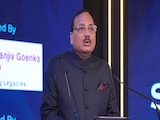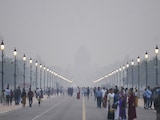Scaling up India's ambitious agenda to combat climate change, Prime Minister Narendra Modi on Monday announced five "amrit tatva" at the COP26 Summit including the target to attain net-zero emissions by 2070.
Delivering the National Statement at the COP26 Summit in Glasgow, he said India will increase its capacity of non-fossil energy capacity to 500 GW and meet 50 per cent of its energy requirements through renewable energy by 2030.
He also said that India will make one billion tonne reduction in total projected carbon emissions and reduce carbon intensity in its economy to less than 45 per cent by 2030.
"In the midst of this brainstorming on climate change, I would like to present five "Amrit tatav" on behalf of India," he said.
PM Modi described them as "panchamrit ki saugat".
"India will take its non-fossil energy capacity to 500 GW by 2030. Second, India will meet 50 per cent of its energy requirements from renewable energy by 2030. Third, India will reduce the total projected carbon emissions by one billion tonnes by 2030. Fourth, by 2030, India will reduce the carbon intensity of its economy to less than 45 per cent. And fifth - by 2070, India will achieve the target of net-zero emissions," he said.
Here are the updates on PM Modi's visit to G20 and COP26 Climate Summit:
Prime Minister Narendra Modi on Monday addressed the COP26 climate summit in Glasgow where he spoke about 'panchamrit' or five nectar elements to deal with the challenge of climate change and said the country will become carbon neutral by 2070.
US President Joe Biden told the COP26 climate summit on Monday that the massive response needed to stop the climate crisis should be seen as an opportunity for the world's economies.
"Within the growing catastrophe I believe there's an incredible opportunity -- not just for the United States, but for all of us," he said.
Prime Minister Narendra Modi is in Glasgow for the COP26 climate summit. The Prime Minister, who flew into Glasgow from the G20 Summit in Italy, will begin the UK leg of his European tour by holding bilateral talks with British Prime Minister Boris Johnson and a meeting with community leaders and Indologists based in Scotland.















